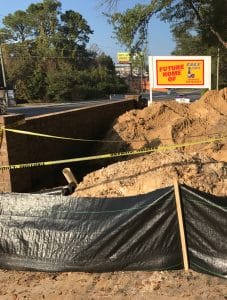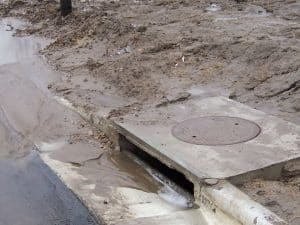How to Obtain Your Stormwater Inspector Certification
Intro
If you’re passionate about environmental conservation and ensuring that construction sites comply with regulations for stormwater management, becoming a certified construction stormwater inspector might be the perfect career path for you. In this blog post, we’ll guide you through the process of obtaining your stormwater inspector certification, including the necessary training, certification programs, exam preparation, and the benefits of holding this certification.
Understanding the Importance of Stormwater Management in Construction
In the realm of construction, managing stormwater effectively is not just a regulatory requirement—it’s a critical environmental safeguard. The significance of stormwater management extends beyond merely adhering to the Clean Water Act; it encompasses the prevention of soil erosion, the minimization of sediment discharge into nearby water bodies, and the reduction of pollutants entering our ecosystems. During construction activities, the disturbance of soil and removal of vegetation can drastically increase the risk of sediment-laden stormwater runoff. This runoff, if not properly managed, can lead to detrimental impacts on aquatic habitats, contribute to the degradation of water quality, and result in significant harm to wildlife dependent on these water sources.
entering our ecosystems. During construction activities, the disturbance of soil and removal of vegetation can drastically increase the risk of sediment-laden stormwater runoff. This runoff, if not properly managed, can lead to detrimental impacts on aquatic habitats, contribute to the degradation of water quality, and result in significant harm to wildlife dependent on these water sources.
The role of construction stormwater inspectors is, therefore, pivotal in mitigating these potential environmental damages. Certified environmental experts are legally trained in inspection and compliance. Through diligent inspection and enforcement of stormwater regulations, inspectors ensure that construction sites implement effective erosion and sediment control measures. These measures are crucial for capturing and treating stormwater on-site, significantly reducing the volume of pollutants reaching our waterways. Additionally, inspectors advocate for the adoption of best management practices (BMPs) tailored to each construction site’s specific needs, further exemplifying the indispensable nature of their work in promoting sustainable construction practices.
Effective stormwater management on construction sites also involves the preparation and implementation of a Stormwater Pollution Prevention Plan (SWPPP). This plan outlines the strategies and practices a construction site will employ to control stormwater pollution. By ensuring these plans are both comprehensive and effectively executed, construction stormwater inspectors play an essential role in bridging the gap between regulatory compliance and environmental protection. Their work ensures that construction sites not only meet legal standards but also contribute to the broader goal of preserving water quality and ecosystem health for future generations.
What is a Construction Stormwater Inspector?
A construction stormwater inspector embodies a crucial role within the construction industry, focusing on safeguarding water quality by ensuring that construction sites adhere to stormwater management and sediment control regulations. These professionals are tasked with the proactive oversight of construction projects to identify potential pollution risks and to enforce compliance with both local and federal environmental laws, including the National Pollutant Discharge Elimination System (NPDES). They conduct regular inspections and audits of construction sites to monitor the effectiveness of Stormwater Pollution Prevention Plans (SWPPP), assessing the implementation of Best Management Practices (BMPs) for erosion and sediment control, and ensuring that silt fences and other sediment barriers are correctly installed and maintained.
The core responsibilities of a stormwater inspector go beyond simple regulatory adherence. They are actively involved in the planning stages of construction projects, collaborating with SWPPP developers to devise comprehensive stormwater management strategies that are both effective and compliant. This includes reviewing site plans, suggesting modifications to better manage stormwater, and providing ongoing guidance to construction teams on the ground.
planning stages of construction projects, collaborating with SWPPP developers to devise comprehensive stormwater management strategies that are both effective and compliant. This includes reviewing site plans, suggesting modifications to better manage stormwater, and providing ongoing guidance to construction teams on the ground.
Their expertise plays a pivotal role in preventing sediment-laden runoff from affecting local waterways, thereby protecting aquatic ecosystems and promoting sustainable development practices. Certified environmental experts are legally trained in inspection and compliance.The position requires a keen eye for detail, a thorough understanding of stormwater management techniques, and the ability to communicate effectively with a range of stakeholders, from construction workers to project managers and regulatory officials. Through their dedicated efforts, construction stormwater inspectors are instrumental in upholding environmental standards, mitigating the potential impacts of construction activities on natural water resources, and contributing to the health and well-being of the community at large.
The Path to Becoming a Certified Stormwater Inspector
Embarking on the journey to achieve certification as a construction stormwater inspector involves a series of educational and practical steps designed to equip candidates with the necessary knowledge and skills. Initially, one must engage in an accredited training program. These programs delve into critical aspects of stormwater management, including but not limited to, understanding the fundamentals of erosion and sediment control, familiarization with NPDES regulations, and the intricacies of developing and implementing Stormwater Pollution Prevention Plans (SWPPP)
The training culminates in a comprehensive examination that tests the candidate’s grasp of the material covered, from regulatory standards to best management practices. Success in this exam is a testament to the candidate’s proficiency and readiness to take on the responsibilities of inspecting construction sites for compliance with stormwater management and sediment control requirements.
Preparation for this examination requires a dedicated review of course materials, alongside practical application of the concepts learned. Engaging with study groups and participating in review sessions can also greatly enhance a candidate’s understanding and readiness for the exam.
Post-certification, inspectors are encouraged to immerse themselves in ongoing learning opportunities and stay abreast of evolving regulations and new technologies in stormwater management. This commitment to continuous improvement not only maintains the validity of their certification but also enriches their capability to contribute effectively to the field of construction stormwater inspection. Through this pathway, aspiring inspectors can transform their commitment to environmental protection into a tangible and impactful career, safeguarding water quality and promoting sustainable construction practices across the United States.
Key Topics Covered in Stormwater Inspector Training
Stormwater inspector training encompasses a comprehensive curriculum designed to prepare candidates for the multifaceted challenges of monitoring and enforcing stormwater management on construction sites. Core topics integral to these training programs include detailed explorations into the principles of erosion and sediment control, providing a solid foundation for understanding how to prevent sediment and pollutants from leaving construction sites.  Trainees delve into the specifics of designing, implementing, and maintaining effective erosion and sediment control measures, such as silt fences and sediment basins, tailored to various construction scenarios.
Trainees delve into the specifics of designing, implementing, and maintaining effective erosion and sediment control measures, such as silt fences and sediment basins, tailored to various construction scenarios.
Another pivotal area of study within these courses is the development and management of Stormwater Pollution Prevention Plans (SWPPP). This involves learning how to create a plan that not only complies with regulatory standards but also effectively addresses the unique stormwater management needs of each construction project. Participants gain insights into the best practices for SWPPP implementation and the continuous monitoring and adjustment of these plans as construction progresses.
Regulatory compliance forms a significant part of the curriculum, with a focus on understanding the National Pollutant Discharge Elimination System (NPDES) permits and requirements. This includes a thorough review of federal, state, and local regulations governing stormwater discharges from construction activities, ensuring inspectors are well-versed in the legal aspects of stormwater management.
Additionally, the training programs cover inspection procedures and reporting protocols, equipping candidates with the skills needed to conduct thorough site inspections, identify compliance issues, and effectively communicate findings to construction managers and regulatory agencies. Emphasis is also placed on the use of Best Management Practices (BMPs) for stormwater management, providing trainees with a toolbox of strategies to minimize environmental impact and promote sustainable construction practices. Through this multifaceted training, aspiring inspectors are prepared to play a key role in protecting water quality and ensuring compliance on construction sites.
Choosing the Right Stormwater Inspector Certification Program
When embarking on the journey to become a certified construction stormwater inspector, the Stormwater Training Center, says selecting the appropriate certification program is crucial. Opt for a program accredited by recognized environmental or construction industry organizations, as this ensures the training meets established professional standards. The curriculum should comprehensively cover topics essential for a stormwater inspector, including but not limited to, erosion and sediment control, Stormwater Pollution Prevention Plan (SWPPP) development, and familiarity with NPDES regulations.
Evaluate the program’s practical training opportunities; hands-on experience is invaluable for understanding real-world applications of stormwater management practices. Additionally, the program’s instructors should have a proven track record in the field, offering insights and knowledge that go beyond textbook theories.
Also, consider the logistics of the program, such as its duration, location, and whether it offers flexibility through online modules or part-time schedules. This is particularly important for working professionals who may need to balance their job responsibilities with certification pursuits. The cost of the program is another significant factor; look for programs that offer a good balance between quality and affordability. Some programs might even provide financial assistance or payment plans.
Finally, assess the post-certification support the program offers, such networking opportunities, and resources for continuous learning. A program that facilitates your growth even after you’ve obtained your certification can be a valuable ally in your career development.
Selecting the right certification program is a decision that sets the foundation for your future in stormwater inspection. It’s essential to choose a program that not only prepares you for the certification exam but also equips you with the skills and knowledge to excel in the field.
Preparing for the Stormwater Inspector Certification Exam
Preparation is key when gearing up for the stormwater inspector certification exam. Diving deep into the curriculum provided during your training course is the first step. This includes a thorough review of all study materials, with a strong focus on understanding the principles of erosion and sediment control, NPDES regulations, and the nuances of Stormwater Pollution Prevention Plans (SWPPP). Taking advantage of practice exams can offer a preview of the exam format and identify areas where further study is needed.
Engaging in interactive study methods can also enhance your comprehension and retention of the material. Joining study groups or online forums dedicated to stormwater inspector certification can provide valuable insights, foster discussions on challenging topics, and facilitate knowledge sharing with peers facing similar challenges. Such collaborative environments can clarify complex regulations and best management practices in a way that solitary study cannot.
Additionally, consider enrolling in a review course if available.  These courses are specifically designed to condense the vast amount of information into manageable, exam-focused sessions that highlight key concepts and commonly tested areas. Instructors in these courses often share useful exam-taking strategies and tips on how to navigate trickier questions effectively.
These courses are specifically designed to condense the vast amount of information into manageable, exam-focused sessions that highlight key concepts and commonly tested areas. Instructors in these courses often share useful exam-taking strategies and tips on how to navigate trickier questions effectively.
Finally, it’s crucial to familiarize yourself with the regulatory documents and guidelines that underpin the certification exam. Directly studying these sources ensures that you have a comprehensive understanding of the current legal and procedural framework governing stormwater management on construction sites. Allocating regular study time and setting achievable goals will keep you on track and steadily build your confidence as you approach exam day.
Maintaining and Advancing Your Stormwater Inspector Certification
Achieving your stormwater inspector certification is a significant milestone in your career, but it’s just the beginning of your journey in environmental protection and construction site management. To remain effective and relevant in this evolving field, ongoing professional development is essential. Active engagement in continuing education is crucial for keeping up-to-date with the latest stormwater management practices, technological advancements, and changes in regulatory frameworks. Many certification bodies require a certain number of professional development hours (PDH) or continuing education units (CEU) to renew your certification, underscoring the importance of lifelong learning in this profession.
In addition to formal education, consider joining professional associations related to stormwater management. These organizations offer resources such as webinars, workshops, and conferences that not only contribute to your continuing education credits but also provide networking opportunities with peers and industry leaders. Networking can lead to insights on emerging trends, collaborative projects, and even new job opportunities.
Advancing your certification through higher levels of accreditation or additional certifications in related fields can further enhance your expertise and employability. Specializations, such as becoming a certified SWPPP developer, can open new doors and allow you to take on more significant roles within projects.
Staying active in the community by participating in forums, contributing to industry publications, and volunteering for environmental projects can also enrich your professional profile. These activities demonstrate your commitment to the field and can provide practical experiences that deepen your understanding of stormwater management challenges and solutions.
Remember, the field of stormwater management is continually evolving, and your growth as a professional should mirror this progression. Engaging in these activities not only maintains your certification but elevates your capacity to contribute to environmental conservation and compliance effectively.
The Benefits of Being a Certified Stormwater Inspector
Achieving certification as a construction stormwater inspector elevates your professional standing, offering a distinct competitive edge in the construction and environmental sectors. This certification is not just a testament to your expertise in stormwater management; it signifies a deep understanding of regulatory compliance, erosion and sediment control, and the development of Stormwater Pollution Prevention Plans (SWPPP), setting you apart in the job market. Certified inspectors often find themselves in high demand, as their skills are crucial for construction projects aiming to meet environmental regulations and avoid potential legal and financial penalties associated with non-compliance.
Moreover, certified stormwater inspectors typically enjoy enhanced earning potential. Their specialized knowledge and ability to navigate complex regulatory landscapes enable them to command higher salaries and consultancy fees. This financial advantage underscores the tangible value of investing time and effort into obtaining and maintaining certification.
Beyond personal gains, certification also fosters professional recognition among peers, industry leaders, and regulatory bodies. It establishes you as a credible authority on stormwater management, opening doors to opportunities for career advancement, leadership roles, and involvement in policy development or advisory capacities. The certification serves as a foundation for building a reputation as a committed environmental steward, passionate about safeguarding water quality and promoting sustainable construction practices. Site managers can contract out stormwater inspections to certified environmental experts.
Certification also offers a platform for continuous learning and professional growth. Certified inspectors have access to a wealth of resources, ongoing training, and a network of professionals dedicated to evolving best practices in stormwater management. This community supports not only individual career progression but also collective efforts to address environmental challenges effectively.
Case Studies: Success Stories of Certified Stormwater Inspectors
Exploring the journeys of certified stormwater inspectors reveals a tapestry of triumphs and transformative work within the realm of environmental conservation. These narratives not only illuminate the professional pathways available post-certification but also underscore the profound impact these inspectors have on safeguarding natural resources and fostering sustainable development practices.
One such story involves a stormwater inspector who played a pivotal role in rehabilitating a local stream that had been severely impacted by construction runoff. Through meticulous oversight and the implementation of innovative erosion control measures, this individual not only restored the stream’s health but also established a model for future projects to follow, significantly reducing sedimentation rates in surrounding waterways.
Another inspiring case features an inspector who spearheaded an initiative to integrate green infrastructure into urban construction projects. By advocating for the use of permeable pavements, rain gardens, and vegetated swales, they not only enhanced stormwater management on multiple sites but also contributed to the beautification of the urban landscape and the promotion of biodiversity.
These success stories exemplify the vast opportunities and responsibilities that come with being a certified stormwater inspector. Each case reflects a dedication to excellence, a commitment to environmental stewardship, and a profound understanding of the critical balance between construction progress and ecological preservation. Through their achievements, certified stormwater inspectors not only advance their careers but also leave a lasting legacy of positive environmental impact.

